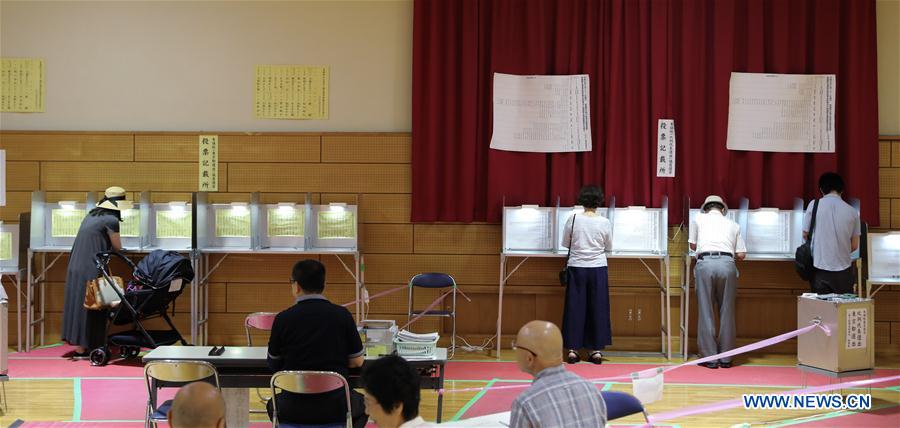
Voters fill out their ballots at a polling station in Tokyo, Japan, July 21, 2019.?(Xinhua/Du Xiaoyi)
TOKYO, July 22 (Xinhua) -- Japan's ruling bloc led by Prime Minister Shinzo Abe won more than half of the contested seats in Sunday's upper house election, maintaining a majority in the chamber.
However, the ruling parties and others who advocate constitutional reform did not pick up enough seats to get a two-thirds majority, a prerequisite for any amendment.
According to early results, the ruling Liberal Democratic Party (LDP) and its coalition partner Komeito won at least 69 out of the 124 seats up for grabs. Holding 70 of the seats in the uncontested half, they crossed the victory line set by Abe to maintain a majority in the 245-seat chamber.
With 370 candidates vying for the 124 seats, 74 are chosen in specific districts and 50 through proportional representation.
As of 3:30 local time Monday, the main opposition Constitutional Democratic Party of Japan increased its seats to 17 from nine before the election but the number of seats secured by the party for the People fell to six from eight.
Abe has stressed the need for stability during the campaign, saying "the biggest issue to be debated at the upcoming election is whether we want to accelerate reforms befitting a new era under political stability, or slide back into an era of chaos."
As results of the election started coming in, Abe said during a TV program that they show voters choosing political stability just as he had called for.
"We've secured a mandate to steadily carry out our politics," he said.
Abe's career goal, before and through his two tenures as prime minister, has been to revise the war-renouncing Article 9 of the supreme law, which bans the maintenance of war potential and the use of war as a means of settling international disputes.
Those opposed to the move, however, believe that such a revision will be used to bolster Japanese forces and their international footprint, in contrast to the pacifist stance of the constitution.
In Sunday's election, the pro-constitutional reform forces did not win the needed 85 seats to get a two-thirds majority. Abe would need such a majority in both upper and lower houses to hold a national referendum on a constitutional amendment.
The premier said he had not targeted a two-thirds majority needed to propose constitutional reform, but he hopes to reach a consensus with the opposition camp though parliamentary debate.
"Of course there is no deadline, but I hope to realize the referendum sometime during my term," he added.
When asked about expectations within the LDP that Abe, as party leader, will seek another term beyond his current one ending in 2021, he said he is not considering such an option "at all."
The ruling coalition and the opposition camp are at odds on other key platform issues include hiking the consumption tax and the state's pension system.
During the campaign period, the LDP and its junior coalition partner Komeito said the tax hike is necessary to be used in expanding child-care support as promised. Opposition parties are against the tax increase, saying their focus is on protecting households.
With the population rapidly aging, the pension system was also at the heart of the election.
Opposition parties have been rattled by the government's handling of a pension report that revealed that under the current system, an average retired couple, if they live to be 95 years old, would face a shortfall of 20 million yen (184,000 U.S. dollars).
Japan's Finance Minister Taro Aso has said the government refused to accept the report from a panel of experts formed by the Financial Services Agency, which he oversees, as its findings were not in line with the government's position on the pension system, which it believes functions effectively as the basis of finances during post-retirement years for households.
Opposition parties have joined forces by fielding unified candidates in all 32 single-seat districts across the country, hoping to become a viable counterbalance to the ruling coalition.
The results show that the ruling camp won 22 of the single-seat districts, while opposition camps grabbed 10.
Members of the upper house serve six-year terms, with about half the seats up for grabs every three years. Due to electoral reform, the number of seats in the upper house will increase by six to 248 in 2022. Of the six, three were added this time to bring the total seats to 245.











